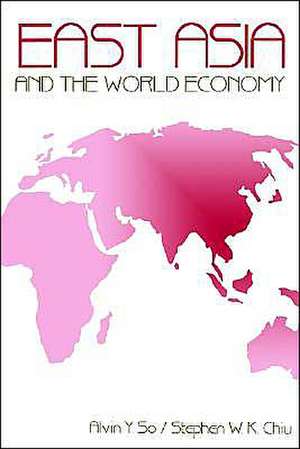East Asia and the World Economy
Autor Alvin Y. So, Stephen W.K. Chiuen Limba Engleză Paperback – 22 aug 1995
| Toate formatele și edițiile | Preț | Express |
|---|---|---|
| Paperback (1) | 614.33 lei 43-57 zile | |
| SAGE Publications – 22 aug 1995 | 614.33 lei 43-57 zile | |
| Hardback (1) | 848.68 lei 43-57 zile | |
| SAGE Publications – 22 aug 1995 | 848.68 lei 43-57 zile |
Preț: 614.33 lei
Preț vechi: 722.75 lei
-15% Nou
Puncte Express: 921
Preț estimativ în valută:
117.59€ • 127.77$ • 98.84£
117.59€ • 127.77$ • 98.84£
Carte tipărită la comandă
Livrare economică 21 aprilie-05 mai
Preluare comenzi: 021 569.72.76
Specificații
ISBN-13: 9780803949003
ISBN-10: 0803949006
Pagini: 319
Ilustrații: black & white illustrations
Dimensiuni: 155 x 232 x 20 mm
Greutate: 0.48 kg
Ediția:Prescurtată
Editura: SAGE Publications
Colecția Sage Publications, Inc
Locul publicării:Thousand Oaks, United States
ISBN-10: 0803949006
Pagini: 319
Ilustrații: black & white illustrations
Dimensiuni: 155 x 232 x 20 mm
Greutate: 0.48 kg
Ediția:Prescurtată
Editura: SAGE Publications
Colecția Sage Publications, Inc
Locul publicării:Thousand Oaks, United States
Cuprins
PART ONE: THEORETICAL INTRODUCTION
Current Perspectives on East Asian Development
PART TWO: INCORPORATION
The Decline of the Chinese Empire
The Great Escape of Japan
PART THREE: REGIONALIZATION
Japan and Its Colonial Empire
The Sino-Japanese War and the Chinese Communist Revolution
PART FOUR: ASCENT
The Socialist Trajectories of China and North Korea
The Corization of Japan
The Semiperipherization of the Newly Industrializing Economies
PART FIVE: CENTRALITY
United States-Japan Hegemonic Rivalry
The Chinese Triangle of Mainland-Taiwan-Hong Kong
Conclusion
Current Perspectives on East Asian Development
PART TWO: INCORPORATION
The Decline of the Chinese Empire
The Great Escape of Japan
PART THREE: REGIONALIZATION
Japan and Its Colonial Empire
The Sino-Japanese War and the Chinese Communist Revolution
PART FOUR: ASCENT
The Socialist Trajectories of China and North Korea
The Corization of Japan
The Semiperipherization of the Newly Industrializing Economies
PART FIVE: CENTRALITY
United States-Japan Hegemonic Rivalry
The Chinese Triangle of Mainland-Taiwan-Hong Kong
Conclusion
Descriere
In this book a world-system perspective is adopted to explain the economic success and political stability of East Asian development. The authors begin with a review of the world-system perspective, exploring its intellectual heritage, the historical context through which it arose, its basic assumptions and its policy implications. They then examine the particular pattern of development of various East Asian countries including: Hong Kong, Taiwan, China, North Korea and Japan.






